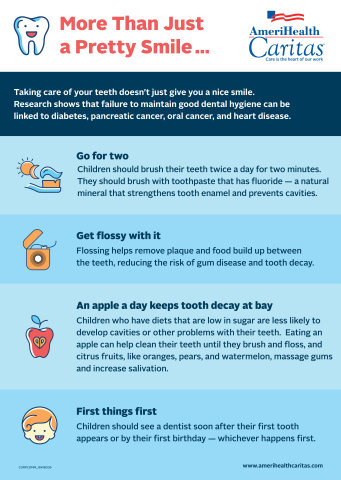PHILADELPHIA–(BUSINESS WIRE)–The benefits of good dental care can result in more than just a pretty smile. And as National Children’s Dental Health Month gets underway, healthcare providers are encouraging parents to help their children develop good oral health habits that can lead to a lifetime of overall health and wellness. According to the Centers for Disease Control (CDC), tooth decay, or cavities, is one of the most common chronic childhood conditions in the United States occurring more among children from low-income or minority families. Studies show:
- Tooth decay is prevalent among 25 percent of children from low-income families – more than double that of children from higher-income families (11 percent).
- African American youths had the most untreated cavities, 17.1 percent compared with Hispanic (13.5 percent) white (11.7 percent), and Asian (10.5 percent) youth.1
The American Dental Association has tracked the historical trend of racial disparity in oral health care — and its correlation to income levels — over several decades, finding that as family income levels increase, the prevalence of untreated cavities and tooth decay decreases.2 Socioeconomic factors and a lack of access to healthcare may contribute to poor dental health for children – problems that, if untreated, can continue as children enter adulthood. AmeriHealth Caritas, a national leader in Medicaid managed care, offers dental benefits to help reduce oral health disparities among children and adults in greatest need.
Failure to maintain good dental hygiene for children can lead to a variety of problems in addition to tooth decay, including halitosis (also known as chronic bad breath), gum disease, and even tooth loss. Additionally, tooth decay can adversely impact a child’s ability to eat, speak and learn.
“The earlier you get a child to the dentist, the better. The more proactive you are about a child’s dental care, the more you can know about his or her dental health and the more likely you are to avert problems down the road,” said Lawrence Paul, DDS, vice president of Corporate Dental with AmeriHealth Caritas.
Poor dental care can also cause serious health problems beyond the mouth and teeth. Research shows that neglecting dental hygiene can be linked to diabetes, pancreatic cancer, and heart disease.3 In very rare cases, tooth decay can be deadly, Dr. Paul added, referencing the tragic case of a 12-year-old Maryland boy who died in 2007 due to a severe brain infection caused by dental decay.
“Oral disease can have an impact on physical, psychological, social, and economic health and well-being through pain, diminished function, and reduced quality of life,” Dr. Paul said. “So it’s vitally important that parents and caregivers know how to best care for the dental needs of their children, showing them how to properly brush and floss so they eventually know how to care for their teeth on their own.”
An early start to good dental hygiene can help develop lifelong habits that contribute to healthier and happier outcomes. Some simple advice to preventing dental problems includes:
Go For Two – Children should brush their teeth twice a day for two minutes. Most municipalities have fluorinated water, but it’s also worthwhile to brush using toothpaste with fluoride, a natural mineral that strengthens tooth enamel and prevents cavities. For young children, parents and caregivers should monitor their children to ensure they are properly brushing all of their teeth and that they avoid swallowing toothpaste, which can upset the stomach and cause gastrointestinal problems.
Get Flossy With It – Even brushing twice a day won’t get rid of all the food and plaque that can become stuck in between teeth. Children should floss once a day to ensure that their teeth are completely clean.
An Apple a Day Keeps Tooth Decay at Bay – Children that have diets low in sugar are less likely to develop cavities or other problems with their teeth. Dr. Paul says children (and adults!) should eat foods that have cleansing effects, such as fruits and vegetables, especially apples. The American Dental Association adds that children should drink plenty of water and eat a variety of foods in addition to fruits and vegetable, including whole grains, lean sources of protein and low-fat dairy foods.
First Things First – Children should see a dentist soon after their first tooth appears or by their first birthday – whichever happens first. The best way to stay on top of dental health is for children to be seen by their dentist twice a year.
About AmeriHealth Caritas
AmeriHealth Caritas is part of the Independence Health Group in partnership with Blue Cross Blue Shield of Michigan. AmeriHealth Caritas is one of the nation’s leaders in health care solutions for those most in need. Operating in 11 states and the District of Columbia, AmeriHealth Caritas serves approximately 5.1 million Medicaid, Medicare and Children’s Health Insurance Program (CHIP) members through its integrated managed care products, pharmaceutical benefit management and specialty pharmacy services, behavioral health services, and other administrative services. Headquartered in Philadelphia, AmeriHealth Caritas is a mission-driven organization with more than 35 years of experience serving low-income and chronically ill populations. For more information, visit www.amerihealthcaritas.com.
1 “CDC: Minorities still most at risk for caries.” ADA.org. April 19, 2018 https://www.ada.org/en/publications/ada-news/2018-archive/april/cdc-minorities-still-most-at-risk-for-caries
2 Gabriel, Erin. “Fewer dental cavities found in young people, but minorities still most at risk.” CNN.com. April 16, 2018. https://www.cnn.com/2018/04/13/health/prevalence-of-cavities-study/index.html
3 Mayo Clinic Staff. “Oral health: A window to your overall health.” mayoclinic.org. November 1, 2018. https://www.mayoclinic.org/healthy-lifestyle/adult-health/in-depth/dental/art-20047475
February is National Children’s Dental Health Month and AmeriHealth Caritas urges parents and caregivers to help children learn how to develop good dental care habits that can prevent overall health problems in the future. (Graphic: AmeriHealth Caritas)
Contact
Monica Lewis
mlewis@amerihealthcaritas.com
*Original press release online at https://www.businesswire.com/news/home/20190130005747/en/

